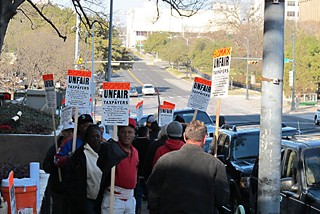Prevailing Wage Doesn't Always Prevail
Carpenters union says workers are getting stiffed on state project
By Richard Whittaker, Fri., Jan. 20, 2012

Workers may not have many rights in Texas, but one big plus is that it is a prevailing-wage state. That means that a laborer or mechanic working on a public project is supposed to be paid the industry standard for that kind of job. However, a local union claims that contractors working on one Austin landmark have been ignoring the statute, paying carpenters about half what they should be getting, and replacing them if they complain.
The ongoing $12.5 million renovation of the Dewitt C. Greer State Highway Building should be a textbook example of a prevailing-wage job. Home to the Texas Department of Transportation, the 1933 art deco edifice at the corner of 11th and Brazos had been cited by the State Fire Marshal's Office on multiple occasions for serious code and safety violations. The project requires numerous essential repairs, including a new sprinkler system, replacing the building's 30-year-old HVAC and electrical systems, asbestos removal, and overdue wall and window renovations. TxDOT* hired San Antonio-based Bartlett Cocke as its general contractor; Bartlett Cocke in turn hired Austin-based Bomax Contractors as a subcontractor, and Bomax hired the carpenters. Under the prevailing-wage law, Bomax should have been paying its workers $25.62 an hour, the standard rate for drywall framing in Austin as calculated by the U.S. Department of Labor; instead, Carpenters Local Union 1266 claims the firm paid the carpenters only $14 an hour and was not deducting taxes or Social Security payments. Union finance secretary Suzanne Litz said, "We informed these workers that they were being taken advantage of, and we informed the company that they were breaking the law."
Litz said that Bomax seemed genuinely interested in resolving the situation and sent the union a certified payroll to show that the workers were now being paid $26 an hour. The union contacted the workers to check that they were really being paid that salary and to inform them that they were still owed back pay to make up for the time when they were underpaid. "We were out there to help the workers that were being taken advantage of, as it's hurting our craft," Litz said. However, several months later, the union found out that Bomax had replaced the crew and was underpaying the new workers.
There was no response to requests for comment on the dispute by Bomax or TFC, and TxDOT declined to comment, saying that it was a matter between the contractors. However, Kirk Kistner, Bartlett Cocke's vice president of marketing and business development, said he was unaware of any formal dispute. He said his firm has received the certified payroll from Bomax, and "they certify whatever wage scale has been established for this project." As for the union demonstrations outside the Greer building, he called them "common" and said they were simply a recruitment tactic. "The unions are trying to enlist employees of nonunion companies," he said, and noted that he had seen such activity increase since the economic collapse began in 2008.
But Litz said the protests are not a publicity stunt and that she has informed Bartlett Cocke that the union will be filing an official wage complaint. The union has also forwarded its documents to the U.S. Department of Labor and the IRS, but she said: "Unfortunately it takes years to be investigated. They just don't have the staff. So we have taken it to a public arena."
Unions like the prevailing-wage law because it guarantees good salaries for skilled workers: On a project driven by safety concerns like the Greer renovation, it would seem logical that the state would want the best workers, not just the cheapest. Litz said research collated by the Texas State Building and Construction Trades Council indicates that not only do prevailing-wage laws have no impact on overall cost for a public project, but the skilled workers hired are more productive and less likely to suffer an on-the-job injury.
The prevailing-wage law is also popular with some construction firms and subcontractors, as it prevents flagrant undercutting during the bidding process, and there have been attempts made to reinforce it. In the last legislative session, Rep. Paul Workman, R-Austin, was joint author of House Bill 2989. Also known as the Workplace Fraud Prevention Act, it would prevent building firms from misclassifying employees as independent contractors, paying them off the books, or failing to withhold taxes. The bill passed out of the House Business & Industry Committee but never got a hearing on the floor. However, the union hopes it will be reintroduced next session and get a fuller hearing. That way, Litz said, "It doesn't matter whether you're a union company or a nonunion company, as long as we're bidding apples to apples and have just as good a chance as somebody else of getting the contract."
* We originally said that Bartlett Cocke was hired by the Texas Facilities Commission as the general contractor on this project. The construction firm was actually hired directly by the Texas Department of Transportation.
Got something to say on the subject? Send a letter to the editor.








